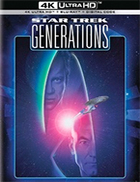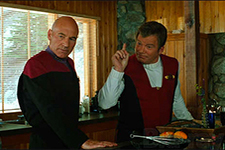| Director: David Carson | | Screenplay: Ronald D. Moore & Brannon Braga (story by Rick Berman & Ronald D. Moore & Brannon Braga; based on Star Trek created by Gene Roddenberry) | | Stars: Patrick Stewart (Picard), Jonathan Frakes (Riker), Brent Spiner (Data), LeVar Burton (Geordi), Michael Dorn (Worf), Gates McFadden (Beverly), Marina Sirtis (Troi), Malcolm McDowell(Dr. Soran), James Doohan (Scotty), Walter Koenig (Chekov), William Shatner (Kirk), Alan Ruck (Capt. Harriman), Jacqueline Kim (Demora) | | MPAA Rating: PG | | Year of Release: 1994 | | Country: U.S. |  |
|  When Star Trek: Generations was released in theaters in November of 1994, it had been three years since the U.S.S. Enterprise had flown across the big screen. The series’ most recent film, Star Trek: The Undiscovered Country (1991), was the last outing of the original cast from the late 1960s television series and six feature films beginning with Star Trek: The Motion Picture (1979). Meanwhile, Star Trek creator Gene Roddenberry had launched a new television series, Star Trek: The Next Generation, in 1987, which ran for 178 episodes, ending in May 1994, with production of the final season overlapping with the production of Generations. Conceived and designed as a way to pass the cinematic torch from William Shatner’s James T. Kirk and the original crew to Patrick Stewart’s Jean-Luc Picard and the Next Generation crew, Star Trek: Generations held a great deal of promise, but it falls flat much more often than it soars. For every good moment there are two or three awkward ones, and while there is an undeniable thrill of seeing the two “generations” of Enterprise captains working together (through the convenience of a time-bending, extra-dimensional canard known as a “nexus”), it is hard not to wish that the film had more grandeur and more guts. The film begins in the 23rd century with a brand-new Enterprise heading out for a maiden test voyager under the command of Captain Harriman (Alan Ruck), who, let’s just say, is no James T. Kirk, who happens to be on board along with Scotty (James Doohan), Chekov (Walter Koenig), and throngs of journalists as ceremonial accoutrement. Of course, they are immediately called in to rescue two ships in distress that have gotten caught in a bizarre energy field, and while they are able to beam aboard a few dozen survivors, including Malcolm McDowell’s seemingly deranged Dr. Soran, things mostly go bad as the new Enterprise is damaged and Kirk is apparently killed in action. We then leap forward 78 years to the early 24th century where Captain Picard and his crew get tangled in a mystery that they soon learn is an extension of what happened almost eight decades earlier. Once again, Dr. Soran is in the middle of it, as we learn that he is hatching a plan to use the nexus to reunite himself with his family, who was killed when his homeworld was destroyed. Soran is bad science run amok, as he is willing to kill anyone and do anything (including partnering with Klingons) to achieve his goals, which are entirely personal and selfish. Picard is struggling with his own emotional demons, as he learns that his brother and nephew have been killed in a fire, making him the last of his family line, which sets up a wish-fulfillment sequence inside the nexus where he has the chance to live the life of a traditional family man, with a houseful of Christmas decorations, a wife, and children who look like they stepped out of the better parts of a Charles Dickens novel. Alas, such is not to be, as Picard must team up with Kirk, who is also inside the nexus, to stop Dr. Soran from doing something he has already done: blow up a star, which causes a shockwave that destroys an entire planetary system and all the main characters along with it. That sounds like heavy stuff, but the way director David Carson, a veteran television director who helmed several episodes of The Next Generation, manages things makes it feel light. It doesn’t help that the budget appears to have been tight and there are a couple of awkwardly managed subplots, including one in which Data (Brent Spiner), the crew’s artificial human member, is implanted with a chip that allows him to experience the gamut of human emotions. There are moments where Spiner is allowed to convey some degree of depth regarding what it would be like to be suddenly awash in emotions and having no sense of how to deal with and manage them, but much of it is given over to him laughing maniacally and acting goofy. Engineer Geordi (LeVar Burton) plays second fiddle to Data’s new emotions, and he also gets kidnapped by a pair of leering Klingon sisters who hack his visor to spy on the inner workings of the Enterprise-D. Written by Next Generation veteran scribes Ronald D. Moore and Brannon Braga from a story they concocted with series co-creator Rick Berman, Star Trek: Generations has a few poignant moments and some memorable lines, particularly Soran’s grim admonishment that “Time is the fire in which we burn,” but too much of it feels lazy and recycled and not up to the task of offering a proper send-off to the original crew while launching the big-screen adventures of the next generation. Shatner hams it up as much as possible, even in his big death scene, but Malcolm McDowell is clearly determined to be the biggest of scenery chewers. He glares and he glowers and his silver hair stands on end menacingly, but it is all in the service of a story that has some good ideas, but can’t hold them together in a meaningful way. | Star Trek: The Next Generation Four-Movie 4K UHD + Blu-ray + Digital Copy Box Set |  Star Trek: Generations is available both individually and as part of the eight-disc “Star Trek: The Next Generation” box set, which includes both 4K UHD discs and Blu-rays, as well as Digital Copies. Star Trek: Generations is available both individually and as part of the eight-disc “Star Trek: The Next Generation” box set, which includes both 4K UHD discs and Blu-rays, as well as Digital Copies. | | Aspect Ratio | 2.35:1 (all four films) | | Audio | English Dolby TrueHD 7.1 surround (all four films) | | Subtitles | English, French, Spanish (all four films) | | Supplements | Star Trek: GenerationsAudio commentary by director David Carson and Manny CotoAudio commentary by Brannon Braga and Ronald D. MooreText Commentary by Michael and Denise OkudaLibrary Computer“Uniting Two Legends” “Stellar Cartography: Creating the Illusion” “Strange New Worlds: The Valley of Fire” “Scoring Trek” “Inside ILM: Models & Miniatures” “Crashing the Enterprise” Scene Deconstruction: Main Title SequenceScene Deconstruction: The Nexus RibbonScene Deconstruction: Saucer Crash Sequence“A Tribute to Matt Jeffries” “The Enterprise Lineage” “Captain Picard’s Family Album” “Creating 24th Century Weapons” “Next Generation Designer Flashback Andrew Probert” “Stellar Cartography on Earth” “Brent Spiner: Data and Beyond Part 1” “Trek Roundtable: Generations” “Starfleet Academy SCISEC Brief 007: Trilithium” Deleted scenesArchivesTrailers Star Trek: First Contact Audio commentary by director and actor Jonathan FrakesAudio commentary by screenplay writers Brannon Braga and Ronald D. MooreAudio commentary by Damon Lindelof and Anthony PascaleText commentary by Michael and Denise OkudaLibrary Computer“Making First Contact”“The Art of First Contact”“The Story”“The Missile Silo”“The Deflector Dish”“From ‘A’ to ‘E’”Scene Deconstruction: Borg Queen AssemblyScene Deconstruction: Escape Pod LaunchScene Deconstruction: Borg Queen’s Demise“Jerry Goldsmith: A Tribute”“The Legacy of Zefram Cochrane”“First Contact: The Possibilities”“Industrial Light & Magic: The Next Generation”“Greetings from the International Space Station”“SpaceShipOne’s Historic Flight”“Brent Spiner: Data and Beyond Part 2”“Trek Roundtable: First Contact”“Starfleet Academy SCISEC Brief 008: Temporal Vortex”“Unimatrix One”“The Queen”“Design Matrix”ArchivesTrailers Star Trek: Insurrection Audio commentary by Jonathan Frakes and Marina SirtisText Commentary by Michael and Denise OkudaLibrary Computer“It Takes a Village”“Location, Location, Location”“The Art of Insurrection”“Anatomy of a Stunt”“Making Star Trek: Insurrection”“Director’s Notebook”“The Star Trek Universe”“Westmore’s Aliens”“Westmore’s Legacy”“Star Trek’s Beautiful Alien Women”“Marina Sirtis - The Counselor Is In”“Brent Spiner - Data and Beyond Part 3”“Trek Roundtable: Insurrection”“Starfleet Academy SCISEC Brief 009: The Origins of the Ba’ku and Son’a Conflict”“Shuttle Chase”“Drones”“Duck Blind”Deleted ScenesArchivesAdvertisingStar Trek: Nemesis Audio commentary by director Stuart BairdAudio commentary by producer Rick BermanAudio commentary by Michael and Denise OkudaText Commentary by Michael and Denise OkudaLibrary Computer“Nemesis Revisited” “New Frontiers – Stuart Baird on Directing Nemesis” “Storyboarding the Action” “Red Alert! Shotting the Action of Nemesis” “Build and Rebuild” “Four-Wheeling in the Final Frontier” “Screen Test: Shinzon” “A Star Trek Family’s Final Journey” “A Bold Vision of The Final Frontier” “The Enterprise E” “Reunion with The Rikers” “Today’s Tech Tomorrow’s Data” “Robot Hall of Fame” “Brent Spiner - Data and Beyond Part 4” “Trek Roundtable: Nemesis” “Starfleet Academy SCISEC Brief 010: Thalaron Radiation” “Romulan Lore” “Shinzon & the Viceroy” “The Romulan Senate” “The Scimitar” Deleted ScenesArchivesTrailers | | Distributor | Paramount Home Entertainment | | Release Date | April 4, 2023 | | | COMMENTS | | All four films in Paramount’s Star Trek: The Next Generation 4-Movie Collection have been given new 4K scans from the 35mm camera negatives and look demonstrably better than the 2009 Blu-rays they are replacing. Obviously, the 2160p Dolby Vision/HDR10 transfers offer substantially enhanced visual information and better detail. Colors are also greatly improved, with a wider color range and much better saturation. What I noticed, however, was that the films look much more cinematic. The 2009 Blu-rays had quite a bit of digital noise reduction and artificial sharpening that took away from their celluloid origins. These new 4K UHD discs display a much more natural looking image that features fine grain and a more filmlike appearance that is much more in keeping with their original theatrical presentations. Each film features a remastered Dolby TrueHD 7.1-channel soundtrack, which again improves on the 5.1-channel mixes on the earlier Blu-rays. There isn’t a ton of difference, although astute ears will certainly detect more dynamic directionality, improved sonic detail, and an all-around more immersive aural experience. As for the supplements, there is nothing new here. Everything that appeared on the earlier Blu-rays is accounted for here, as the set includes a Blu-ray disc for each film that includes both the remastered film and all the supplements (aside from the commentaries, which are also included on the 4K discs). I won’t go through it all here, as the range of supplements is both deep and wide, encompassing multiple audio commentaries, text commentaries, behind-the-scenes featurettes, screen tests, special effects reels, and more. |
Copyright © 2023 James Kendrick Thoughts? E-mail James Kendrick All images copyright © Paramount Home Entertainment |


 (2)
(2)

 Star Trek: Generations is available both individually and as part of the eight-disc “Star Trek: The Next Generation” box set, which includes both 4K UHD discs and Blu-rays, as well as Digital Copies.
Star Trek: Generations is available both individually and as part of the eight-disc “Star Trek: The Next Generation” box set, which includes both 4K UHD discs and Blu-rays, as well as Digital Copies.